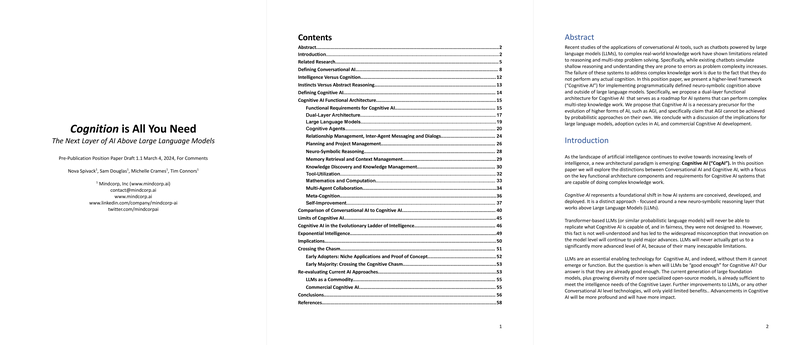Advancing AI Beyond LLMs: The Emergence of Cognitive AI
Introduction
The landscape of AI is on the cusp of a transformative shift with the rise of Cognitive AI (CogAI), an evolution beyond the capabilities of current LLMs. This advancement promises to bridge the gap between simulated cognition exhibited by LLMs and the genuine cognitive processing necessary for complex problem-solving in knowledge work. As we navigate this pivotal transition, the focus of AI innovation is moving towards developing systems that not only mimic human-like interactions but possess the ability to reason, learn from experience, and improve autonomously.
Beyond LLMs: The Need for Cognitive AI
Despite the remarkable achievements of LLMs in simulating human-like text generation and understanding, their intrinsic limitations become apparent when tasked with complex knowledge work. LLMs operate on pattern recognition and statistical probabilities, lacking the ability to perform genuine cognition or understand the context beyond their training constraints. This fundamental deficiency underscores the necessity for a higher-order AI capable of true reasoning and learning - haLLMarks of Cognitive AI.
The Architecture of Cognitive AI
Cognitive AI distinguishes itself through a dual-layer architecture, where a sophisticated cognitive layer operates above the probabilistic conversation layer of LLMs. This structure equips Cognitive AI with a suite of advanced cognitive functions, including abstract reasoning, knowledge management, and strategic planning. By leveraging both deterministic and probabilistic approaches, Cognitive AI can navigate and solve multifaceted problems with precision and adaptability, far exceeding the capabilities of conversational AI systems.
Knowledge Management and Reasoning in Cognitive AI
A cornerstone of Cognitive AI’s superiority is its adeptness in managing and utilizing structured knowledge. Unlike LLMs, Cognitive AI can represent, store, and retrieve knowledge explicitly, facilitating deep reasoning and the generation of novel insights. Through advanced knowledge discovery and management capabilities, Cognitive AI can continually enhance its intelligence, dynamically adapting to new information and complexities.
Meta-Cognition: The Pinnacle of Cognitive AI
Meta-cognition, or the ability of a system to understand and improve its cognitive processes, sets Cognitive AI apart from its predecessors. This capability enables Cognitive AI to self-assess, optimize its strategies over time, and engage in a level of introspection analogous to human cognitive development. The integration of meta-cognition profoundly expands AI's utility in problem-solving, signifying a leap towards achieving higher-order intelligence.
Implications and Future Directions
The emergence of Cognitive AI marks a decisive phase in AI’s evolution, promising to redefine problem-solving across myriad domains. Its capacity for continuous learning and adaptation paves the way for collaborative human-machine intelligence, expanding the horizons of what AI can achieve. As we delve into the era of Cognitive AI, the focus of innovation and investment in AI will inevitably shift towards developing and enhancing these sophisticated cognitive systems.
Cognitive AI not only represents the next frontier in AI but also a critical step towards more ambitious goals such as AGI. By bridging the gap between the simulated cognition of LLMs and genuine intelligence, Cognitive AI opens up new pathways for enhancing human capabilities and solving some of the world's most complex challenges.
Conclusion
The transition from LLMs to Cognitive AI underscores a pivotal shift in the quest for artificial intelligence that rivals human cognition. Through its advanced architecture, ability to manage knowledge, and capacity for meta-cognition, Cognitive AI is set to revolutionize the landscape of AI. This evolution from probabilistic mimicry to genuine reasoning and learning heralds a new era of AI - one where machines can truly understand, think, and innovate alongside humans, promising unprecedented advancements in technology and problem-solving.
